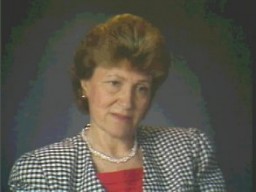<< Previous | Displaying results 561-570 of 571 for "" | Next >>
-
Simone Weil Lipman describes helping children as an OSE worker in Rivesaltes
Oral HistoryWhen Simone was three her family moved to Strasbourg, where her father bred sheep. Simone and her brother were active in Jewish scouting. In 1940, she worked as a teacher in Paris. The Germans invaded western Europe in May 1940. Simone and her family fled German-occupied France for the unoccupied southern zone. There Simone worked at an internment camp for foreign-born Jews. She tried to provide forged documents in an attempt to save lives. Later, Simone assumed a false name and joined the Children's Aid…
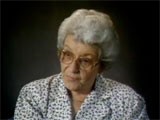
-
Simone Weil Lipman describes helping the Children's Aid Society (OSE) move children to safety in southern France
Oral HistoryWhen Simone was three her family moved to Strasbourg, where her father bred sheep. Simone and her brother were active in Jewish scouting. In 1940, she worked as a teacher in Paris. The Germans invaded western Europe in May 1940. Simone and her family fled German-occupied France for the unoccupied southern zone. There Simone worked at an internment camp for foreign-born Jews. She tried to provide forged documents in an attempt to save lives. Later, Simone assumed a false name and joined the Children's Aid…
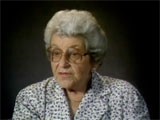
-
Simone Weil Lipman describes camp conditions and her work for the Children's Aid Society (OSE) in Rivesaltes
Oral HistoryWhen Simone was three her family moved to Strasbourg, where her father bred sheep. Simone and her brother were active in Jewish scouting. In 1940, she worked as a teacher in Paris. The Germans invaded western Europe in May 1940. Simone and her family fled German-occupied France for the unoccupied southern zone. There Simone worked at an internment camp for foreign-born Jews. She tried to provide forged documents in an attempt to save lives. Later, Simone assumed a false name and joined the Children's Aid…
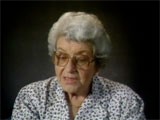
-
Hana Mueller Bruml describes an encounter with a non-Jewish friend in Prague
Oral HistoryIn 1942, Hana was confined with other Jews to the Theresienstadt ghetto, where she worked as a nurse. There, amid epidemics and poverty, residents held operas, debates, and poetry readings. In 1944, she was deported to Auschwitz. After a month there, she was sent to Sackisch, a Gross-Rosen subcamp, where she made airplane parts at forced labor. She was liberated in May 1945.
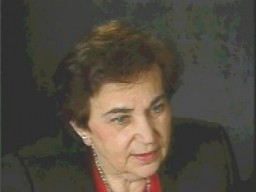
-
John Komski describes resistance activities in Krakow, including an underground newspaper
Oral HistoryJohn, who was born to a non-Jewish Polish family, graduated from an art academy. Following the German invasion of Poland on September 1, 1939, John was in Krakow. Food became scarce in Krakow, with long lines of people waiting for whatever food was available. John decided to join the resistance against the Germans. By early 1940, he and two of his friends felt that they were in danger and decided to try to escape to France. John was caught and arrested during this escape attempt. He survived imprisonment…
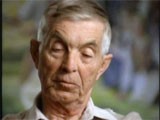
-
Mieczyslaw Madejski describes battle during the Warsaw Polish uprising
Oral HistoryMieczyslaw and his family were not Jewish. When Germany invaded Poland, Mieczyslaw was working for an organization formed for self-defense against German bombings. Later, he worked for the Polish underground group ZWZ (Zwiazek Walki Zbrojnej; Union for Armed Struggle), which became the AK (Armia Krajowa; Home Army). In 1943, he was conscripted for forced labor at a BMW plant in Warsaw. He escaped, and participated in the Warsaw Polish uprising in August 1944. After the uprising, he left Warsaw and went…
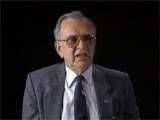
-
Mieczyslaw Madejski describes underground work in the early 1940s
Oral HistoryMieczyslaw and his family were not Jewish. When Germany invaded Poland, Mieczyslaw was working for an organization formed for self-defense against German bombings. Later, he worked for the Polish underground group ZWZ (Zwiazek Walki Zbrojnej; Union for Armed Struggle), which became the AK (Armia Krajowa; Home Army). In 1943, he was conscripted for forced labor at a BMW plant in Warsaw. He escaped, and participated in the Warsaw Polish uprising in August 1944. After the uprising, he left Warsaw and went…
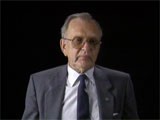
-
Mieczyslaw Madejski describes underground organization and activities
Oral HistoryMieczyslaw and his family were not Jewish. When Germany invaded Poland, Mieczyslaw was working for an organization formed for self-defense against German bombings. Later, he worked for the Polish underground group ZWZ (Zwiazek Walki Zbrojnej; Union for Armed Struggle), which became the AK (Armia Krajowa; Home Army). In 1943, he was conscripted for forced labor at a BMW plant in Warsaw. He escaped, and participated in the Warsaw Polish uprising in August 1944. After the uprising, he left Warsaw and went…
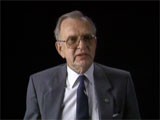
-
Blanka Rothschild describes antisemitic regulations in occupied Lodz, Poland
Oral HistoryBlanka was an only child in a close-knit family in Lodz, Poland. Her father died in 1937. After the German invasion of Poland, Blanka and her mother remained in Lodz with Blanka's grandmother, who was unable to travel. Along with other relatives, they were forced into the Lodz ghetto in 1940. There, Blanka worked in a bakery. She and her mother later worked in a hospital in the Lodz ghetto, where they remained until late 1944 when they were deported to the Ravensbrueck camp in Germany. From Ravensbrueck,…
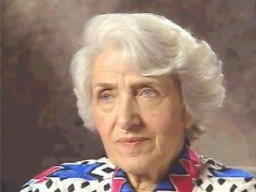
-
Fritzie Weiss Fritzshall describes restrictions placed on Jews in Klucarky
Oral HistoryFritzie's father immigrated to the United States, but by the time he could bring his family over, war had begun and Fritzie's mother feared attacks on transatlantic shipping. Fritzie, her mother, and two brothers were eventually sent to Auschwitz. Her mother and brothers died. Fritzie survived by pretending to be older than her age and thus a stronger worker. On a death march from Auschwitz, Fritzie ran into a forest, where she was later liberated.
